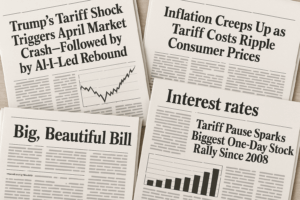
Bond Yields and Oil Price War
News & CommentaryBy: Christopher D. Ross, CFP®
Mar 13, 2020
The markets have been roiled this week, falling by more than 20% and ending the longest bull market on record at 11 years. While the main culprit is the ongoing coronavirus outbreak, which is causing the shutdown of sporting events and trade shows, and turning some major cities into varitable ghost towns, a couple of other things have investors spooked, too.
Here’s what you need to know:
Bond yields hit record lows
Yields on 10-year Treasurys hit record lows earlier this week, dipping below 1% for the first time in history and bottoming-out at around 0.3%. Yields refer to the total return investors can expect to see over the time they own a bond, such as a Treasury, and low yields are indicative of high demand for bonds.
And if bonds are in demand, it often means that stocks are not, and that the markets are dropping. Some investors use the 10-year Treasury yield as an economic indicator — a weather vane, of sorts, as to how the markets and economy will react going forward. When yields fall, it generally means that bonds are in demand.
Often considered one of the safest investments on the market, 10-year Treasury yields are also important because they’re closely associated with interest rates. When the Fed cuts rates, yields tend to follow.
An oil war price war breaks out
If a viral outbreak and dampening economic outlooks weren’t enough, price shocks in the oil market caused further problems in the market. On Monday, OPEC failed to reach a deal with other leading oil producers like Russia, creating a price war. As a result, oil prices fell 20%, and the stock market followed.
Oil prices have actually dropped below $35 per barrel. It’s actually cheaper to have dinner delivered than to purchase a barrel of crude oil, to put things in perspective.
It’s unclear how things will play out, but with the uptick in domestic oil production in the U.S. in recent years, many American producers are in danger of being priced out of the market, and going out of business. Add in that the coronavirus outbreak is likely to decrease demand for oil — as people stop traveling in their cars and airplanes — prices could drop even further.
While the market’s have mostly absorbed the shock, we’ll have to wait to see if the world’s producers can come to an agreement to stabilize prices, and help the markets.
In all, there’s a lot going on. The markets are taking a beating, but the important thing for investors to remember is that panicking is never the right decision. Crazy things happen, and it’s important for long-term investors to keep the markets in perspective. As always, if you’re feeling uneasy, it’s never a bad idea to reach out to your advisor.
The content is developed from sources believed to be providing accurate information. The information in this material is not intended as tax or legal advice. It may not be used for the purpose of avoiding any federal tax penalties. Please consult legal or tax professionals for specific information regarding your individual situation. The opinions expressed and material provided are for general information.
The views and opinions expressed herein are those of the speaker or writer and do not necessarily reflect the views of Alliance Wealth Advisors, LLC. All opinions are subject to change without notice. Neither the information provided nor any opinion expressed constitutes a solicitation for the purchase or sale of any security. Past performance is no guarantee of future results. Diversification does not guarantee a profit or protect against loss in a declining financial market.


